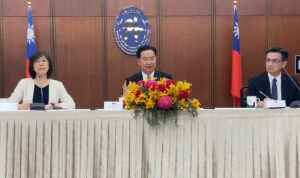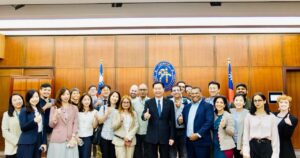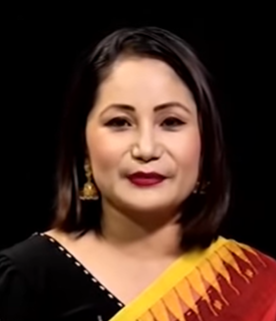The self-rule island nation of Taiwan looks forward to strengthening cultural, economic, and shared interests with India. Taiwan’s Minister for Foreign Affairs Dr. Joseph Wu has expressed Taiwan’s eagerness for the same. Highlighting India’s status as the world’s largest democracy and its rich cultural heritage, the Taiwan Minister emphasized the attraction it holds for Taiwanese people. The recent signing of a migration and mobility agreement on February 16, 2024, signifies a significant step towards facilitating employment opportunities for Indian workers across diverse sectors in Taiwan. While the specific implementation details of the Memorandum of Understanding are yet to be finalized, the agreement holds promise for fostering mutual benefits for both nations.

“India is the biggest democracy in the world and its cultural heritage is always attracting Taiwanese people”— Dr. Joseph Wu
During a recent meeting with journalists from India, Japan, South Korea, New Zealand, and Taiwan participating in the Indo-Pacific Journalists Study Tour and Dialogue 2024 in Taiwan, titled “Enhancing Regional Connections,” Dr. Joseph Wu, Taiwan’s Minister for Foreign Affairs, reiterated his country’s dedication to strengthening cultural and economic relations with India. He discussed the challenges and necessary measures required to advance such collaborative projects, while also emphasizing the importance of joint efforts in safeguarding democracies from the People’s Republic of China (PRC).
Dr. Joseph Wu shared his fascination with Indian cinema, noting the increasing popularity of Bollywood movies in Taiwan. He mentioned some of his favorite Indian films, with “Bahubali” standing out as his personal favorite. The minister expressed optimism regarding the future prospects of Indian movies in Taiwan, as well as in health, education, and agricultural relations. He emphasized the Taiwanese government’s commitment to promoting these aspects and continuing to do so. Dr. Wu enthusiastically recounted the celebrations of Indian festivals such as Diwali and Holi, which were held for the first time in Taiwan.
When asked by this journalist from Manipur, India regarding common security concerns posed by China towards India and Taiwan, in the wake of China’s repeat claims over parts of Arunachal Pradesh situated in India’s North East region and possible hands in facilitating violence and insurgencies at the Indo-Myanmar border state of Manipur which is also in the country’s North East, the Taiwan Foreign Minister acknowledged the journalist’s question regarding common security concerns posed by China towards both India and Taiwan. He expressed concerns over these security challenges and emphasised the importance of vigilance and cooperation between India and Taiwan in addressing them.
“We have seen international communities reacting to Chinese expansionism. China is not targeting Taiwan alone. All federal democracies are being challenged. We have witnessed Election interference primarily coming from the cyberspace. We know that this is a problem for Taiwan and we also know that this also can be a very serious problem for federal democracies. For example, India is running elections right now and I am sure that there is no shortage of disinformation initiated by the PRC. There will be more elections throughout federal democracies this year and therefore Taiwan needs to share its experience on how to deal with disinformation with federal democracies, the Taiwan Foreign Minister said.
“We don’t provoke but we don’t budge to China’s pressure policy wise”—-Taiwan Foreign Minister
Dr. Joseph Wu, Minister of Foreign Affairs, Taiwan also highlighted the potential for semiconductor production collaboration between Taiwan and India, emphasizing India’s appeal as a destination for major supply chains moving out of China. He underlined the importance of infrastructure, reliable resources like water and electricity, and streamlined regulations to attract semiconductor investments in India. He also stressed the need for a complete supply chain, including IC designers, testers, and material suppliers. He expressed optimism that discussions between the two nations would lead to concrete actions to realize this vision.

When asked by another journalist from India, whether Taiwan is serious about actually opening a chip making facility in India and not just being a tech partner, Dr Joseph Wu said, “Discussions have been going on between the two countries and we have a lots of hope in this future semiconductor production collaborations. If you look at international supply chain, major companies, major supply chains are moving out of China for good reasons and India is a preferred site for their destination. Right now there are 2,700 high quality engineers from India working in high tech companies in Taiwan and this is a very good starting point. If we could have more, they could train more engineers qualified to work in India’s semiconductor industries. And other than that infrastructure has to be there. This is an area where our industries are not quite certain about, these industries require reliable supply of water and electricity and especially electricity and other than that transportation facility has to be there, the minister stressed. If the Indian Government is serious about this and putting all these together, I think it would be highly attractive for the semiconductor industries to think about investments in India”, he said.
The minister also urged the Indian Government to streamline its rules and regulations. “India is known to be very cumbersome in its tax and administrative structure and I think it would require for the Indian government to look at this in a more serious way to streamline all kinds of rules and regulations to work on semiconductor investors coming into India. Finally, for semi conductor industries to move to India, we need to think about the whole supply chain coming together, we need to have IC designer, testing, Packaging, material supply etc. High tax rate and tariffs would be an impediment to industries wanting to make investments in India. The vision is there and talks are underway between the two nations so that right action will be taken to realise the vision”, the Taiwan minister said.
Taiwan has established itself as a prominent microchip manufacturer, asserting dominance in the global marketplace. In 2024, Taiwan’s semiconductor sector contributed around US$115 billion, representing approximately 20 percent of the global semiconductor industry. Particularly in foundry operations, Taiwanese firms hold a commanding 50 percent share of the world market, with the Taiwan Semiconductor Manufacturing Company (TSMC) also known as Taiwan Semiconductor,
emerging as the largest player in the foundry market. Renowned as the world’s second most valuable semiconductor company, TSMC is the largest dedicated independent semiconductor foundry globally. Headquartered and primarily operating in the Hsinchu Science Park in Hsinchu, Taiwan, TSMC stands as the largest company in the country. While majority-owned by foreign investors, the central government of Taiwan holds the largest shareholder position. In 2023, TSMC secured the 44th spot in the Forbes Global 2000 rankings.
The bilateral relations between India and Taiwan have seen improvement since the 1990s, despite the absence of official diplomatic ties. Economic, commercial, and people-to-people connections have expanded notably in recent years. With the signing of the MoU, both nations will engage in follow-up discussions to finalize the procedures for implementing the migration and mobility pact. These discussions will cover various aspects such as the industries open to Indian workers, the quantity of jobs available, regions in India for sourcing migrant workers, required qualifications, language proficiency, and recruitment methods.

The writer is an award winning journalist and TV anchor. She is currently Associate Editor, Impact TV.











